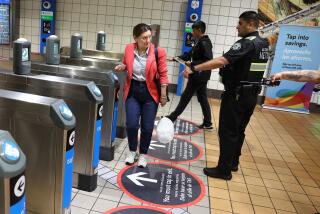RTD Revises Appeal Rules on Metro Rail Business Tax
- Share via
Hoping to blunt some of the criticism of Metro Rail-related tax increases on downtown properties, the Southern California Rapid Transit District board Wednesday approved a major overhaul of its method of handling appeals of the payments.
In separate actions, the board voted to slash filing fees for appeals and to establish a new panel of retired superior or appellate court judges to hear property owners’ pleas for relief.
Property owners, some of whom have been shocked by recent tax bill increases of 500% or more, charged that the appeals program discourages formal protests because it is too costly and is biased in favor of the transit district.
“The board is trying to make this the fairest and (most) above-board process possible,” said Carmen Estrada, vice president of the RTD board and chairwoman of a committee that reviewed the appeals procedures.
The controversy over the appeals is an outgrowth of protests over a new Metro Rail “benefit assessment” levied on about 1,500 properties near the proposed downtown and MacArthur Park stations of the first leg of the subway.
The assessment, the largest effort in the nation to require businesses near a new transit system to help pay for its construction, is designed to raise 11% of the $1.25-billion cost of the first segment. The premise behind the tax is that land values will increase and business will improve near the transit stations.
So far, about 20 appeals have been filed, and none has yet reached the board. Critics attribute the low number of appeals to the fact that, until Wednesday, non-refundable filing fees of $200 to $5,000 per parcel were required.
Under the new plan, property owners can get a preliminary staff review of their tax bill without having to pay a filing fee. A more detailed staff analysis would cost a flat $50.
The board also created a new level of appeal--between the staff and the RTD board--consisting of a three-member panel of retired judges. The judges could reverse or uphold staff decisions and forward their findings to the RTD board, which ultimately must decide all appeals.
The board did not eliminate the requirement for a deposit of $1,000 or more to cover administrative costs for all appeals of staff decisions, either to the judges or the RTD board.
Sam Rubinfeld, spokesman for a newly formed group of property owners who are fighting the tax increases, told reporters that while he is pleased by the board’s actions, the fees are still too high and the grounds for appeals too limited. For example, he said, property owners cannot file an appeal generally challenging the alleged benefits of the subway system.
Rubinfeld’s group, made up largely of small property owners, is organizing a legal and political challenge to the tax. About 200 property owners attended the group’s meeting Friday.
But the RTD’s Estrada strongly defended the tax and said the board has no intention of reconsidering it. She said the protests are coming from “just a handful of vocal property owners” and that most property owners appear to understand the benefits of the subway.
In percentage terms, she said, the largest tax increases have been on properties that had been “significantly undervalued” because of limits on assessment increases imposed by Proposition 13. Property owners near stations should not be allowed to reap “enormous windfalls from the expenditure of public funds” on Metro Rail, she said.
More to Read
Sign up for Essential California
The most important California stories and recommendations in your inbox every morning.
You may occasionally receive promotional content from the Los Angeles Times.










